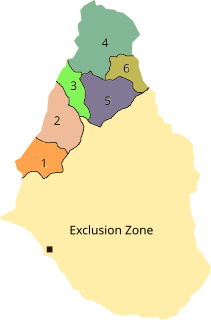
The Social Democratic Front is the main opposition party of Cameroon. It is led by Ni John Fru Ndi and receives significant support from the Anglophone regions of the western part of the country.

Ni John Fru Ndi is a Cameroonian politician. He founded the Social Democratic Front (SDF), the main opposition party in Cameroon, in 1990, and he has led the party since then.
The Cameroon Democratic Union is a political party in Cameroon. It was founded by Adamou Ndam Njoya, a former Minister of National Education under President Ahmadou Ahidjo, on 26 April 1991.

Elections in Benin take place within the framework of a multi-party democracy and a presidential system. Both the President and the National Assembly are directly elected by voters, with elections organised by the Autonomous National Electoral Commission (CENA).

Elections in Cameroon gives information on election and election results in Cameroon.

Elections in Montserrat take place within the framework of a multi-party democracy and a parliamentary system. The Legislative Assembly is directly elected, and a Chief Minister is selected by the party or coalition with the most seats in the Assembly.

The unicameral National Assembly is the legislative body of the Republic of Cape Verde.

The National Assembly is the lower house of the Parliament of Cameroon. It has 180 members, elected for five-year terms in 49 single and multi-seat constituencies.

Parliamentary elections were held in Cameroon on 22 July 2007, with voting in some districts re-run on 30 September. Local elections were held on the same day, with seats on 363 town councils at stake. The result was a victory for the ruling Cameroon People's Democratic Movement (RDPC), which won 153 of the 180 seats in the National Assembly, whilst the main opposition party, the Social Democratic Front (SDF), won 16 seats.
The National Union for Democracy and Progress is a political party in Cameroon, drawing its main support from the north of the country. It was established as an opposition party in the early 1990s and won the second largest number of seats in the 1992 parliamentary election. The UNDP's National President is Maigari Bello Bouba, who is currently a Minister of State in the government.
Dakole Daïssala is a Cameroonian politician and the President of the Movement for the Defense of the Republic (MDR), a political party based in Cameroon's Far North Region. He served in the government of Cameroon as Minister of State for Posts and Telecommunications from 1992 to 1997; subsequently he was a Deputy in the National Assembly from 1997 to 2002 and then Minister of Transport from 2004 to 2007. He has served in the Senate since 2013.

General elections were held in Cameroon on 24 April 1988 to elect a President and National Assembly. The country was a one-party state at the time, with the Cameroon People's Democratic Movement as the sole legal party. Its leader, incumbent Paul Biya was the only candidate in the presidential election, and was re-elected unopposed.

Parliamentary elections were held in Cameroon on 1 March 1992. They were first multi-party elections for the National Assembly since 1964, although they were boycotted by the Social Democratic Front and the Cameroon Democratic Union. The result was a victory for the ruling Cameroon People's Democratic Movement, which won 88 of the 180 seats. Voter turnout was 60.7%.

Parliamentary elections were held in Cameroon on 30 June 2002. The result was a victory for the ruling Cameroon People's Democratic Movement, which won 149 of the 180 seats. In 17 constituencies the result was cancelled by the Supreme Court due to irregularities and the election re-run on 15 September.

Parliamentary elections were held in Nigeria on 30 December 1964, although they were not held until 18 March 1965 in some constituencies in Eastern Region, Lagos, and Mid-Western Region due to a boycott in December. The election saw most parties run as part of alliances, the Nigerian National Alliance and the United Progressive Grand Alliance.

Parliamentary elections were held in British Cameroons on 24 January 1959. The result was a victory for the Kamerun National Democratic Party, which won 14 of the 26 seats in the House of Assembly.

Parliamentary elections were held in British Cameroons on 30 December 1961. The result was a victory for the Kamerun National Democratic Party, which won 24 of the 37 seats in the House of Assembly.

Parliamentary elections were held in Cameroon on 30 September 2013, alongside local elections. They were originally scheduled for July 2012, February 2013 and July 2013, but were repeatedly postponed.









